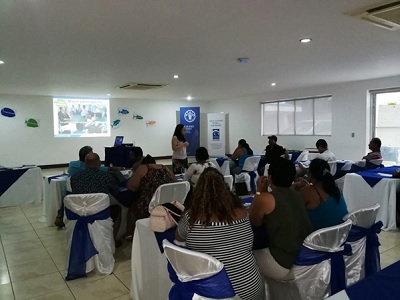INCOPESCA, with the support of FAO, trains more than 400 fishers in Costa Rica in ecosystem management
- Sustainable development is promoted by the fishing sector
More than 400 fishers, including women, learn about the Ecosystem Approach to Fisheries Management (EAFM) and the Voluntary Guidelines for Securing Sustainable Small-Scale Fisheries in the Context of Food Security and Poverty Eradication (SSF Guidelines), to achieve the sustainability of small-scale fisheries. The training had the aim of raising awareness of the correct use of natural resources, implement responsible fishing practices and recognize fishing work.
"We have understood that we must not only have an extraction mentality of fishery resources. Instead, it is necessary to manage adequately the resources in order not to harm future generations and to maintain a balance between conservation and production," said Rolando Ramírez Robles of the Association of Fishermen of Pochote.
The workshops are taught by technicians of the Extension and Training Department of the Costa Rican Institute of Fisheries and Aquaculture (INCOPESCA, for its initials in Spanish) with the support of the Food and Agriculture Organization of the United Nations (FAO), through the project of Sustainable Management of Bycatch in Latin America and the Caribbean Trawl fisheries (REBYC II-LAC).
"Our staff has gone through a process of updating these issues, with the contribution of the REBYC II-LAC project, to share an approach or model that benefits the fishing sector," commented Jorge López Romero, Head of the Department of Extension and Training of the INCOPESCA.
The EAFM contributes to the development of sustainable fisheries by seeking a balance between ecological and human well-being through good governance.
According to Ana Lucrecia Barrantes, Coordinator of the REBYC II-LAC project in the country, the EAFM provides the knowledge and tools to build sustainable fisheries management plans adapted to each of its marine areas and their needs, considering the valuable ancestral knowledge of fishers.
 Ana Lucrecia Barrantes, National coordinator for the REBYC-II LAC in a training |
In addition, it allows identifying the main problems faced by fisheries and associated ecosystems to provide solutions and involve fishers in decision-making with government actors in a participatory manner."Now there is greater recognition of the value chain and we have more participation of young people, women and children in the processes of preservation of resources," said Sonia Medina, a fisher from Isla Venado and president of the Local Association of Fishers of Florida, Isla Venado de Puntarenas.Also, fishers, including women, receive training to implement the SSF Guidelines .The purpose of the SSF Guidelines is to make visible and recognize the valuable role of artisanal fishing and to promote social and economic development under the axes of governance of tenure in fisheries and resource management, decent work, value chains, gender equity, climate change and disaster risks.Likewise, both workshops guide the dialogue, policy processes and measures that allow the sector to contribute to food security and the reduction of poverty.According to Ramírez, the application of the approach and the seminars has allowed them to mitigate the use of illegal arts, promote the inclusion of young people and women in associations or cooperatives and train community leaders to transmit what they have learned in other coastal communities.The process of dissemination of the Guidelines is carried out with the collaboration of the Network of Marine Areas of Responsible Fisheries (AMPR).Currently, within the framework of the REBYC II-LAC project, workshops on SSF Guidelines are given in Barra del Colorado.
